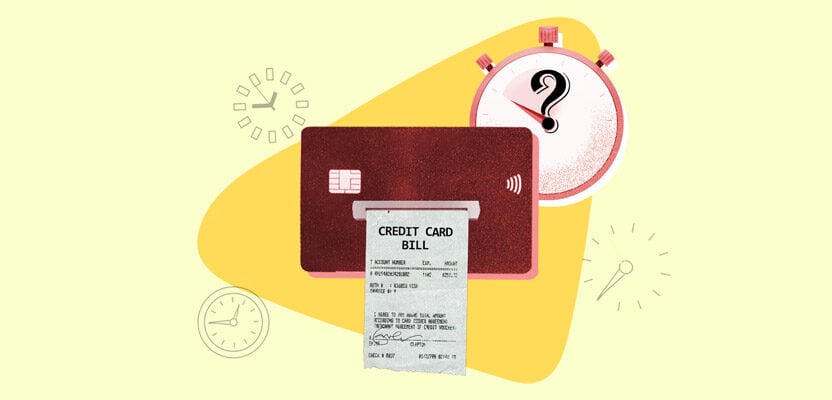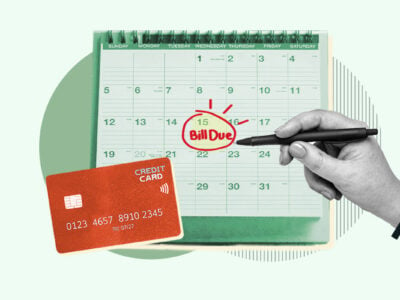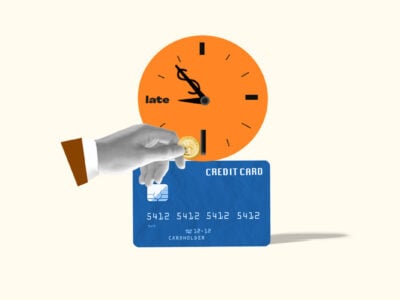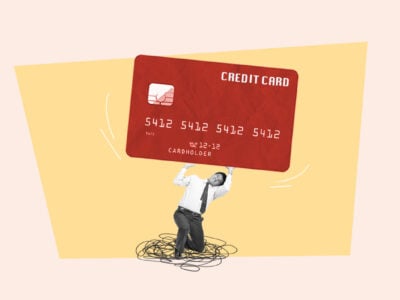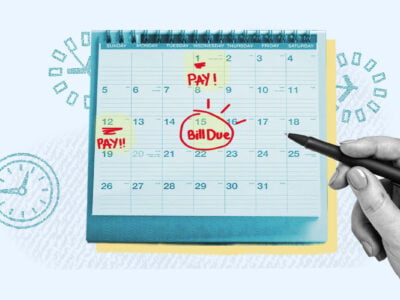Understanding the best time to pay your credit card bill can be tricky. Do you pay on the closing date or the due date? Does paying your balance early help your credit score? What’s the best time to pay your credit card to build credit?
We’ll walk you through the ins and outs of paying your credit card, from billing cycle terminology to the best time to pay your credit card for maximizing your credit score.
Table of Contents
When should I pay my credit card bill?
You should pay your credit card bill in full before the due date every month. If you can’t pay the full amount, make sure you at least make the minimum payment before the due date.
Your payment history counts toward 35% of your FICO credit score, so paying your credit card bill on time each month is the best step you can take toward maintaining a good credit score. 1
Failing to at least pay your minimum by the due date may result in:
- Interest accrual
- Late fees
- Increased interest rates
To find out what your credit card due date is, you can check your monthly bill or your online banking account. Most major credit card companies have online payment management systems where you can find the details of your credit card billing cycle.
If you have multiple credit cards with different due dates (which can get confusing), you can call your provider and ask for a change of due date so all your accounts are due on the same day.
When is the best time to pay my credit card bill?
The best time to pay your credit card bill is early in its cycle. Choosing to pay within certain time frames within a billing cycle can benefit you and your credit score even further (due to how your credit issuer reports your balance to credit reporting agencies).
To understand the best time frames for paying off your credit card, you first need to know the following terms:
- Payment due date: This is the date by which you need to pay your minimum balance to avoid a late fee. You also need to pay your full balance by this date if you want to avoid accumulating interest.
- Statement closing date: Your credit card’s closing date is usually 21 days before your payment due date and marks the last day of the billing cycle. Your monthly interest charge and minimum payment will be calculated on this day, and your statement will be posted on your online account or mailed to you. 2 Your statement will indicate your statement balance, which may differ from your current balance.
- Grace period: The grace period on your credit card is the time between your statement closing date and your payment due date. Keep in mind that credit card companies aren’t required to have a grace period, but many do. Purchases made during your grace period won’t be charged interest if you pay your monthly balance in full. 3
How early should I pay my credit card bill?
If you’re able to pay your credit card bill early, here are the two best times to pay your balance:
- Before the statement closing date: Credit card companies will usually report your balance on, or a couple days after, your statement closing date. If you pay your credit card bill before then, a balance of zero will be reported to the bureaus, lowering your credit utilization rate. 4
- Before making a large purchase: To keep your credit utilization rate (the amount of available credit you’re using) from spiking after a large purchase, pay off your balance beforehand. This will also keep you from incurring a large amount of interest (the higher your balance, the higher your interest charge will be if you no longer have a grace period. So keep your balance low throughout the billing cycle to reduce interest and lower your utilization rate.
3 benefits of paying your credit card bill early
Here’s how paying your credit card early can help you save money and potentially raise your credit score:
1. Saving yourself from accidental late fees
Paying your credit card balance early ensures you won’t accidentally miss the due date and end up with a late fee. Keep in mind that mail-in checks and online payments may take a few days to process, so the earlier you pay, the less you risk missing your due date.
2. Avoiding paying interest
If your credit card provider offers a grace period, you can take advantage of this timeframe to avoid paying interest on your credit card. If you pay your bill in full by the due date, you can make purchases during your grace period without incurring interest to be paid in the following billing cycle. So if your bill is paid before or during your grace period, you can enjoy interest-free spending for roughly 20 days. 5
3. Lowering your credit utilization rate
Your credit utilization rate is the percentage of available credit you’re using, calculated by dividing your outstanding balance by your total available credit. Credit utilization is an important factor in your credit score, with a lower rate being better.
Your creditors report your balance to the credit bureaus before the payment due date, so paying your card off earlier increases your chances of having a low balance reported, thus lowering your utilization rate and improving your score. 6
Tips for managing your credit card bill payments
Paying your credit card at the perfect time is easy enough in theory, but managing credit card payments––especially across multiple cards––can be a challenge. Here are a few tips on how to better manage your credit card bill payments:
- Use your credit card wisely: Using your credit card is a great way to build credit. However, using it irresponsibly can cost you a lot of money and damage your credit score. Use your credit card for purchases you know you can pay off within the month. If you need to make a large purchase and pay it off over time, ensure you can at least meet the minimum payments every month and pay the entire balance within three months.
- Set up automatic payments: Set up automatic payments to ensure you don’t accidentally miss a due date (better yet: schedule your payments for before your statement closing date). You can set up autopay through your credit card account, or you can set up a recurring payment through your bank account.
- Consolidate your credit card debt: Consolidate your debt if you’re managing multiple credit cards to lower your interest rate and streamline your payment schedule. All you need to do is transfer your balance from other cards onto your credit card with the lowest interest rate. Then, set up automatic payments on that card so your balance is easily paid at the right time every month.
Other ways you can boost your credit score with credit cards
Paying off your credit card in full and at the right time every month is one of the best ways to achieve a high credit score. But if you really want to reach for that perfect 850 and improve your credit score even further, follow these tips:
- Avoid canceling cards: If you’re no longer using a card, you may be tempted to cancel it to avoid annual fees or overspending. But canceling a line of credit will raise your credit utilization ratio by lowering your overall available credit. Unless your card is costing you a lot in fees, try to stash it away for emergency use only instead of canceling altogether.
- Increase your credit limit: Keeping your credit utilization low is a critical part of getting a good credit score. To lower your ratio, you can use less credit or have a higher credit limit (or, ideally, both). Simply contact your lender and ask them to increase your credit limit.
- Apply for new credit only when you need it: Opening new lines of credit can have negative impacts on your credit score. Lenders will perform a hard inquiry when you apply for an account, which will temporarily shave some points off your score. Furthermore, the age of your accounts plays a role in your credit score, so a new card will bring down the average age.
While it’s impossible to get a perfect score overnight, responsibly managing your credit accounts will keep your credit score on the rise.
